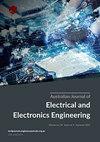Superconducting and non-superconducting fault current limiters: the developmental journey and upcoming prospects
Q3 Engineering
Australian Journal of Electrical and Electronics Engineering
Pub Date : 2022-05-21
DOI:10.1080/1448837X.2022.2075108
引用次数: 1
Abstract
ABSTRACT The energy hunger society drives for more electrical power consumption to raise the human conveniences have put tremendous pressure on the existing power system (PS) to function uninterruptedly. The continuous addition of non-linear loads brings a heavy inrush of fault current leading to transient instability in PS. To protect the PS and its precious elements, fault current limiters (FCLs) are generally installed with a view to limit those FCs before inviting severe damage and also quickly restore the PS to its original state. Furthermore, since faults are inevitable, efforts can only be made to minimise those damages by improving the FCLs. Herein, a brief history of FCLs, concepts, working principles, developmental stages, and experimental data, along with theoretical predictions, have been systematically presented. Finally, this article elaborates on the current challenges of FCLs, future perspectives, and, most importantly, their market potential.超导与非超导故障限流器的发展历程与展望
社会对能源的渴求使人们对电力的需求越来越大,以提高人们的生活便利,这给现有电力系统的不间断运行带来了巨大的压力。非线性负载的不断增加会带来大量的故障电流,导致PS系统的暂态失稳。为了保护PS系统及其珍贵元件,通常会安装故障限流器(FCLs),以便在发生严重损坏之前限制故障电流,并迅速恢复PS系统的原始状态。此外,由于故障是不可避免的,因此只能通过改进fcl来尽量减少这些损害。本文系统地介绍了fcl的简史、概念、工作原理、发展阶段、实验数据以及理论预测。最后,本文详细阐述了fcl当前面临的挑战、未来的前景,以及最重要的市场潜力。
本文章由计算机程序翻译,如有差异,请以英文原文为准。
求助全文
约1分钟内获得全文
求助全文
来源期刊

Australian Journal of Electrical and Electronics Engineering
Engineering-Electrical and Electronic Engineering
CiteScore
2.30
自引率
0.00%
发文量
46
期刊介绍:
Engineers Australia journal and conference papers.
 求助内容:
求助内容: 应助结果提醒方式:
应助结果提醒方式:


